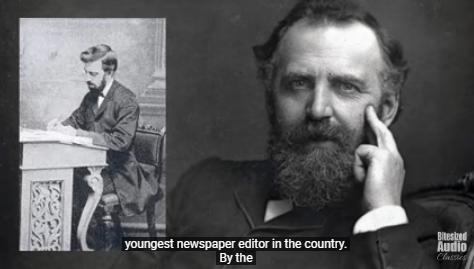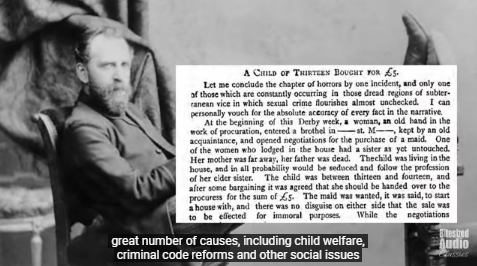Essays Contents
The Titanic
December 25, 2022

This eye-witness story published in 1886 demonstrates
that recklessness on the high seas was commonplace.
Predicting the Titanic, a story by W.T. Stead
an audiobook by YouTube Channel "Bitesized Audio Classics"

W. T. Stead was a passenger on the Titanic.
He had been invited to Washington D.C. by President Taft.

From video notes:
William Thomas Stead was a celebrated journalist and newspaper editor in late Victorian and Edwardian Britain. He was born in 1849 in Embleton, Northumberland, the son of Congregational minister William Stead and his wife Isabella, a Yorkshire farmer's daughter. Stead was educated at home, and his mother proved to be a formative influence on his future career, as he witnessed her activism for women's rights, most notably in relation to the passage of the Contagious Diseases Acts in the 1860s.
Stead cut his teeth in journalism on the Darlington-based Northern Echo, rising to become the paper's editor at the age of just 22 – thus becoming the youngest newspaper editor in the country. He married Emma Lucy Wilson in 1873, and together they had six children.
Stead fought for Liberal causes and was credited with helping the Liberal Party under William Gladstone to a landslide victory in the 1880 general election. In the same year he moved to London and was appointed an assistant editor of The Pall Mall Gazette (one of the forerunners of today’s London Evening Standard); he took over as editor in 1883.

A well known and controversial figure in his day, Stead was a pioneer of what we now call investigative journalism – and he used his platform at The Pall Mall Gazette to lead campaigns on a great number of causes. His high profile campaigning against child prostitution was to land him in prison for a short period in 1885 (as an unintended consequence of an undercover investigation where he pretended to purchase an underage girl, Eliza Armstrong, to highlight the issue) but the incident cemented his reputation.
'How the Mail Steamer Went Down in Mid-Atlantic' is a relatively minor work by Stead, in which he raises the issue of the lack of lifeboats on the big ocean-going liners. In the years after the story was published, the British Board of Trade did make some changes to the regulations, in 1894, but these changes too were soon to become inadequate.
The 1894 rules were applied on the basis of a ship's tonnage rather than the number of people on board, and at that date the largest ship afloat was 10,000 tons: nothing larger than that was envisaged. By the early 1900s ships such as the Mauretania (1906) were surpassing 30,000 tons, and the Titanic in 1912 set a new record at 46,000 tons. Yet these ships had only to follow the same rules as those of 10,000 tons, despite carrying greater numbers of passengers and crew.
It was not until after the sinking of the Titanic that the regulations were completely overhauled and lifeboat space for all those on board became a requirement.
By an incredible tragic irony, W. T. Stead himself was a first class passenger on the Titanic, and he died in the sinking.
Of course, the lack of lifeboat spaces alone did not entirely account for the loss of life on the Titanic, but the disaster seized the public imagination, not least due to the number of famous and wealthy people on board who died along with Stead and 1,500 others. In the aftermath of the sinking, this minor piece composed by Stead some 26 years earlier gained renewed interest, for understandable reasons, and it was re-printed in the Review of Reviews later in 1912.
In his later years, Stead had developed a strong interest in the subject of spiritualism, and he wrote widely on the subject from the 1890s onwards. This story is sometimes cited as Stead foreseeing his own death. Oddly enough, another story written by Stead, 'From the Old World to the New' (1892) also has echoes of the Titanic disaster – one section of that story involves the rescue of survivors from a steamship which has sunk after striking an iceberg.
Stead was survived by his wife and six children. His reputation as a pioneering journalist spread across the world, and he is commemorated by memorials in Central Park, New York, as well as in London and Darlington, England.

This eye-witness story published in 1886 demonstrates
that recklessness on the high seas was commonplace.
Predicting the Titanic, a story by W.T. Stead
an audiobook by YouTube Channel "Bitesized Audio Classics"

W. T. Stead was a passenger on the Titanic.
He had been invited to Washington D.C. by President Taft.



